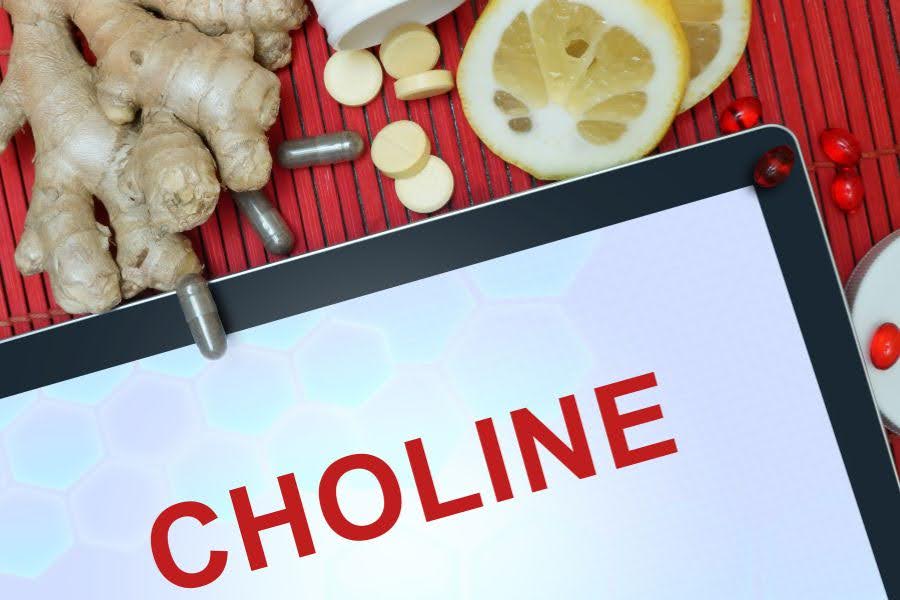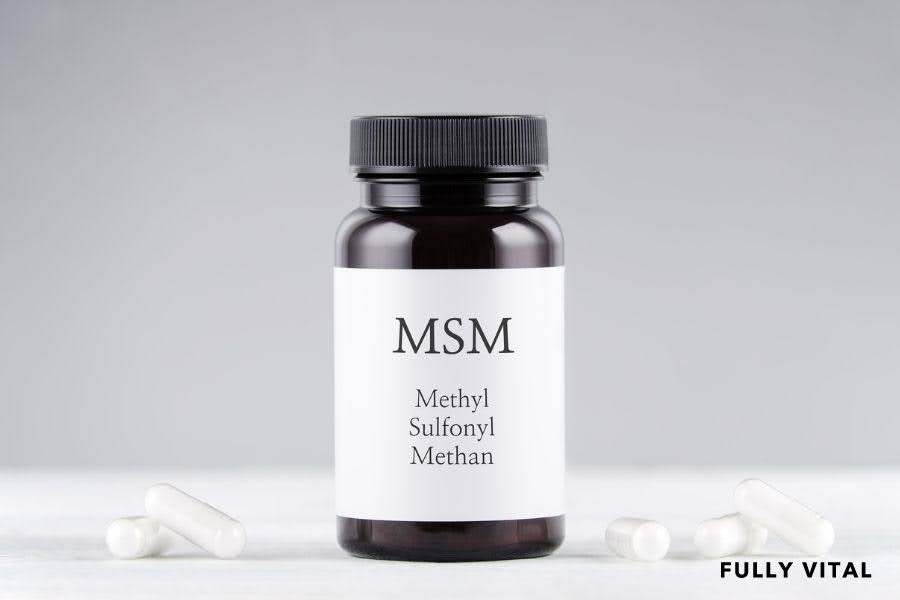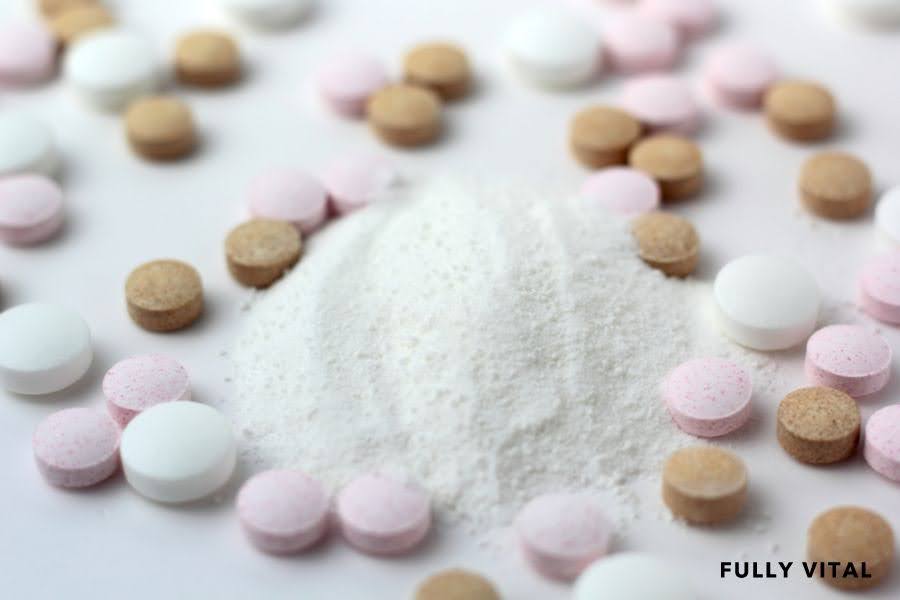
Choline: Feeding Your Hair From Within
Hair is more than a feature of your appearance; it's a reflection of your internal health.
While many nutrients contribute to the luster, strength, and growth of your hair, one often-overlooked compound is choline.
This essential nutrient isn't just vital for brain function and liver health—it's equally important for maintaining and improving hair health.
Incidentally, the link between choline and hair isn’t just a superficial connection; it's rooted in science and biology.
To further enhance your hair's health and address thinning at the root, consider the Fully Vital Enhance Hair Growth Serum.
Experience the difference and boost your hair health today.

I LOVE MY HAIR NOW
FullyVital hair serum and hair vitamins made tremendous improvements in my hair. I truly love my hair now.
Shop Hair ProductsWhat Is Choline?
Choline is a nutrient that's essential for various bodily functions, including cell structure and messaging.
It's a component of lecithin, found in many fats within the body, and is critical for creating acetylcholine, a neurotransmitter involved in memory and muscle control.
Choline also assists in transporting and metabolizing fats, which can prevent excess fat and cholesterol from accumulating in the liver.
While the body can produce choline in small amounts, it's not enough to meet daily needs, making it necessary to consume it through our diet.
Adequate choline intake is important for overall health, but its role in hair health is particularly compelling, which we will discuss further.
Why Does Hair Health Matter?
Healthy hair is not merely a cosmetic concern; it's a sign of a well-nourished body.
Hair health can often be an indicator of nutritional status, including the adequacy of certain vitamins and minerals in our diet.
Maintaining healthy hair contributes to self-image and well-being, and problems with hair quality can signal deeper health issues.
Understanding the nutrients critical for hair strength and growth, such as choline, can help people not only look their best but also maintain their overall health.

What Are The Signs Of Choline Deficiency And Excess?
Recognizing Choline Deficiency
A deficit in choline can lead to muscle damage, liver problems, and nonalcoholic fatty liver disease (NAFLD).
Symptoms related to deficiency might include cognitive changes, such as memory impairment or difficulty processing information.
Due to choline's role in hair health, deficiency may also manifest as hair thinning or loss.
As it is crucial for transporting fats, inadequate choline can result in a buildup of fat in the liver, potentially leading to liver damage.
Pregnant women are at particular risk for choline deficiency as it's essential for fetal brain development, emphasizing the importance of adequate intake.
Identifying Choline Excess
Though rare, too much choline can cause side effects, primarily a fishy body odor due to the breakdown of choline into trimethylamine.
High levels of choline can also lead to low blood pressure, excessive sweating, and a reduction in salivation.
In some cases, excess intake can contribute to heart disease, as choline is involved in the production of a substance that can increase cardiovascular risk.
It's essential to maintain a balance in choline levels to avoid the potential negative impacts of having too much.
Balancing Choline Intake
The key to avoiding deficiency or excess is to consume choline in moderation, according to recommended dietary guidelines.
Symptoms of deficiency or excess can often be subtle and gradual, making regular dietary assessment important.
Those with liver or kidney issues, or pregnant and breastfeeding women, should be especially mindful of their choline intake.
Consulting with a healthcare provider can help tailor choline consumption to individual health needs and mitigate the risk of unbalanced intake.
How Does Choline Impact Hair Health?
Choline's Role In Hair Growth
Choline is an important component of the hair growth cycle, particularly during the anagen phase, where hair actively grows.
It contributes to the integrity of hair follicle cells and helps to regulate the function of follicle stem cells.
Choline also aids in the synthesis of proteins that are essential for hair strength and resilience.
The presence of choline in the scalp's skin layers suggests it plays a role in maintaining the scalp environment conducive to healthy hair growth.
Furthermore, its part in fat metabolism means choline can contribute to the nutrient-rich blood supply to hair follicles, necessary for their nourishment.

Choline's Involvement In Scalp Health
A healthy scalp is the foundation for healthy hair, and choline is instrumental in maintaining skin integrity and preventing inflammation within the scalp.
As a component of cell membranes, choline ensures that skin cells on the scalp are replenished and function effectively.
Because it aids in transporting fats, it's also vital for the nourishment and protection of scalp cells.
Moreover, choline's anti-inflammatory properties can help alleviate scalp conditions that potentially impede hair growth, underscoring its significance in a complete hair care routine.
The Supportive Role Of Choline In Hair Structure
Choline contributes to the structural components of the hair itself by being part of the makeup of different cell membranes within each hair strand.
It helps maintain the water balance in hair fibers, affecting the hair's elasticity and strength.
Choline also plays a role in the hair's ability to withstand environmental stressors, such as UV rays and pollutants.
Although it's not a magic bullet for hair health, choline's involvement in these multiple areas illustrates its comprehensive support for the integrity and vitality of hair.
How Much Choline Do You Need For Healthy Hair?
The recommended daily intake of choline varies based on age, gender, and life stage.
For adults, the adequate intake for men is set at 550 milligrams per day and for women at 425 milligrams per day.
Pregnant or breastfeeding women may require higher amounts to support fetal and newborn development.
While overconsumption is rare, it's generally advised not to exceed the tolerable upper intake level of 3,500 milligrams per day for adults.
For hair health, adhering to the daily recommended intake is sufficient to support the associated biological processes affecting hair growth and wellness.
How Can You Incorporate Choline Into Your Diet For Better Hair Health?
Dietary Sources High In Choline
To ensure you're getting enough choline, focus on including a variety of choline-rich foods in your diet.
Egg yolks are one of the most concentrated sources of choline, making them an easy addition to any meal.
Meat, fish, and poultry are also significant sources, with the liver being particularly rich in choline.
For vegetarians or those looking to diversify their intake, nuts, seeds, and legumes like soybeans and lentils provide good amounts of choline as well.
Including these foods in your meals can naturally boost your choline levels and support hair health.
Choline Through Supplementation
While diet should be the primary source of choline, supplements are available for those who may have difficulty meeting their needs through food alone.
Choline supplements typically come in the form of choline bitartrate, phosphatidylcholine, or lecithin.
However, it's crucial to discuss the addition of supplements with a healthcare provider to ensure they're necessary and to determine the appropriate dosage.
Relying only on supplements without considering the synergy of nutrients in whole foods may not provide the same benefit for hair health.
Creating A Choline-Rich Meal Plan
Incorporating choline into your diet can be simple with a bit of planning.
Start with a breakfast that includes eggs or a sprinkle of wheat germ.
For lunch and dinner, consider meals that feature lean proteins, whole grains, and vegetables such as broccoli and Brussels sprouts, which are also good sources of choline.
Snacking on nuts or enjoying a smoothie with soy lecithin can boost your intake between meals.
Remember to balance these with other hair-healthy nutrients for an overall approach to your dietary wellness.
Elevate Your Hair Wellness With Fully Vital
Ready to enrich your hair care regimen? Embrace Fully Vital's hair growth products for a healthier, more vibrant mane. |
Final Thoughts On Choline
Choline is more than a nutrient; it's a key player in maintaining overall health and, by extension, hair health.
It's often overshadowed by other vitamins and minerals, but as we've seen, choline deserves consideration in any health-conscious individual's diet.
With a vast array of food sources and the option for supplementation if necessary, ensuring adequate choline intake can be a manageable part of your nutritional routine.
Similarly, addressing hair health can be straightforward with Fully Vital's variety of hair growth products, a doctor-recommended, vegan solution designed to combat thinning with natural ingredients for fuller, healthier hair in just 90 days.
Read Also:
- Rogaine Or Fully Vital: Decoding The Secrets To Thicker, Fuller Hair
- All About Hair Volumizer: A Comprehensive Guide For Gorgeous Locks
- Mizani Vs. Fully Vital: A Comprehensive Comparison For Textured Hair Care
Frequently Asked Questions About Choline
Is choline clinically proven to benefit hair health?
While specific clinical studies on choline exclusively dedicated to hair health are limited, research does show that choline plays a role in cell structure and function, which indirectly supports hair health.
Can taking choline stop hair loss?
Choline intake alone is unlikely to stop hair loss, as hair loss can be due to many factors.
However, ensuring adequate choline can support overall hair health.
How long does it take for choline to affect hair health?
The impact of choline on hair health, as with most nutrients, isn't immediate.
Consistent dietary intake over weeks to months is necessary to notice changes.
Is there a specific form of choline that's best for hair health?
No specific form of choline is claimed to be the best for hair health.
A balanced intake from varied sources is the most beneficial approach.
Can I get enough choline for my hair by eating a vegetarian or vegan diet?
Yes, vegetarian and vegan diets can include several plant-based sources of choline, though the variety and quantity may need to be increased compared to an omnivorous diet.
Does choline supplementation have any side effects?
When taken within the recommended limits, choline supplements are generally considered safe.
Excessive intake can lead to side effects like fishy body odor and low blood pressure.
Are there certain people who need more choline for their hair?
There is no established specific need for additional choline for hair health, but pregnant and breastfeeding women, in general, need more choline for overall health.
Are there any hair care products with choline as an ingredient?
Some hair care products may contain choline or its derivatives; however, the effectiveness would depend on the product formulation and how choline is utilized.
Will choline help with hair growth if I have a genetic predisposition for baldness?
Genetic predispositions for hair loss may not be fully counteracted by nutrient supplementation, including choline.
However, a proper intake can support overall scalp and hair health.
Does the body store choline, or do I need to consume it daily?
The body doesn't store choline in large amounts, so regular dietary consumption is necessary to maintain adequate levels and support functions like hair health.
Sources:
- Adatto, I., Deuschle, M., Mendelson, M., & Harel-Levison, S. (2017). Nutritional factors and their role in hair loss: A review. Dermatologic Therapy, 30(2), 121-127. doi:10.1111/dth.12505 https://www.researchgate.net/publication/11196756_Nutritional_factors_and_hair_loss
- Bhagwat, S., & Bhagwat, V. (2014). Choline: Significance in human health. Advances in Food and Nutrition Research, 71, 113-149. doi:10.1016/bs.afnr.2014.01.001 https://www.mdpi.com/2072-6643/15/13/2900
- Botting, N. P., & Prescott, L. (2021). Hair loss in women: Treatment options and future directions. Clinical Therapeutics, 43(12), 1906-1922. doi:10.1016/j.clinthera.2021.08.026 https://www.sciencedirect.com/topics/nursing-and-health-professions/hair-loss








